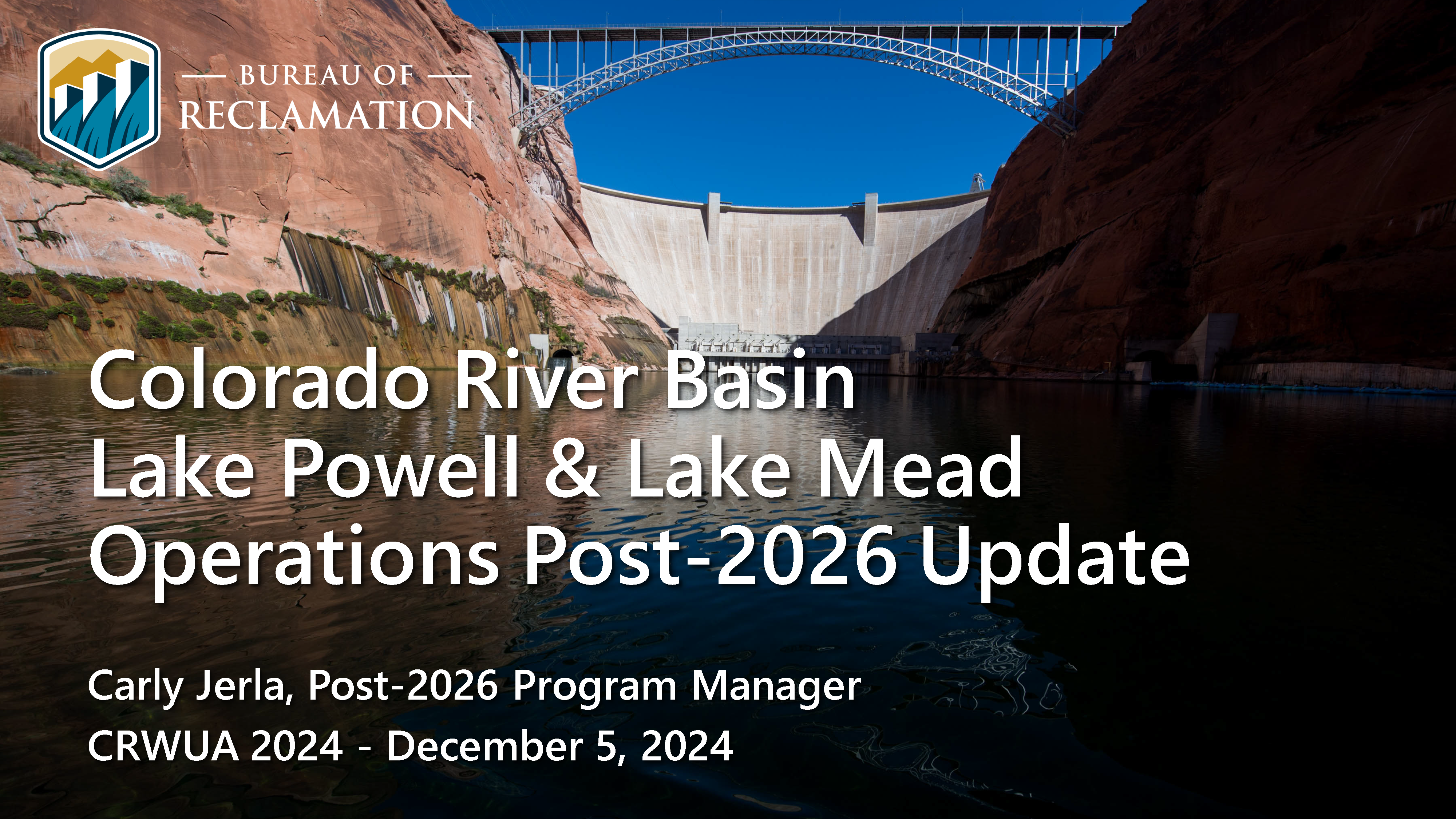- Reclamation
- Colorado River Basin
- Colorado River Post 2026 Operations
Notice: English is the official language and authoritative version of all federal information.
Colorado River Post 2026 Operations
Several reservoir and water management decisional documents and agreements that govern the operation of Colorado River facilities and management of the Colorado River are scheduled to expire at the end of 2026. These include the 2007 Colorado River Interim Guidelines for Lower Basin Shortages and Coordinated Operations for Lake Powell and Lake Mead (2007 Interim Guidelines), the 2019 Drought Contingency Plans, as well as international agreements between the United States and Mexico pursuant to the United States-Mexico Treaty on Utilization of Waters of the Colorado and Tijuana Rivers and of the Rio Grande (1944 Water Treaty).
The Post-2026 process is a multi-year NEPA process that will identify a range of alternatives and determine operations for Lake Powell and Lake Mead and other water management actions for potentially decades into the future.
Announcements and Events
-
Colorado River Post 2026 Operations
-
Reclamation provides an update on Post-2026 process and alternatives at Colorado River Water Users Association Meeting
 Dec. 5, 2024 Reclamation's Carly Jerla provided an update on Lake Powell & Lake Mead Operations Post-2026. View presentation
Dec. 5, 2024 Reclamation's Carly Jerla provided an update on Lake Powell & Lake Mead Operations Post-2026. View presentation -
Status Update Webinar-Alternatives Development
Reclamation held a webinar on Thursday, October 10, 2024, to provide a status update on the Post-2026 Process, including an overview of the ongoing work to develop NEPA alternatives.
Webinar Presentation -
Integrated Technical Education Workgroup Session #6 - Web Tool Operational Paradigms and Uncertainties Follow Up; November 2, 2023
This session describes the role of alternative paradigms in the Post-2026 Operations Exploration Tool (Web Tool) and explains the concepts and levers that can be combined into 48 customizable paradigms in the Web Tool strategy creation interface. It also reviews the approach to representing uncertainty in hydrology, demands, and initial conditions in Web Tool modeling and describes the specific inputs chosen for each category. The webinar materials are available for review.
-
Scoping Summary Report, Purpose and Need, Proposed Federal Action
Reclamation published a Federal Register Notice announcing the availability of the Scoping Summary Report for the Post-2026 Process. The Scoping Summary Report provides a summary of the comments received during the public scoping process and describes the Department’s current, preliminary assessment of the proposed federal action, purpose and need, and scope of the environmental analysis to be included in the draft environmental impact statement (DEIS). Read More →
-
Integrated Technical Education Workgroup Session #5 - Metrics, Tradeoffs, Robustness and Vulnerability; September 20, 2023
This session features academic experts from University of Colorado, Boulder, who describe the specific DMDU approach being used in the post-2026 alternatives development process. It also provides information about how Reclamation will approach specific analytical components in the Post-2026 Web Tool. The webinar materials are available for review.
Draft Environmental Impact Statement
On January 9, 2026, Reclamation released the Post-2026 Operational Guidelines and Strategies for Lake Powell and Lake Mead – Draft Environmental Impact Statement (EIS) for public download. The formal public review and comment period begins on January 16, 2026 after publication in the Federal Register Notice and ends on March 2, 2026. Reclamation will hold two virtual public meetings to provide information on the Draft EIS. For more information on the document and public involvement process, visit the Draft EIS page.
Alternatives Report
On January 17, 2025, Reclamation published an Alternatives Report documenting the alternatives Reclamation publicly released on November 20, 2024, and anticipates carrying forward for analysis in the draft EIS, which is currently under development. The report also describes, in general terms, the process undertaken by Reclamation to develop the alternatives, provides a detailed description of the operational elements for each alternative, and compares the operational elements across each alternative. Read More →
If there are questions or you would like to submit a comment, please email: crbpost2026@usbr.gov.


